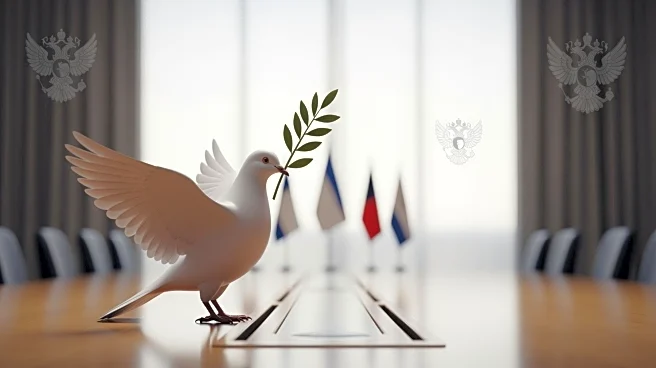What's Happening?
President Donald Trump has called for an armistice between Russia and Ukraine, suggesting that both nations halt their military actions at their current positions. This proposal was made during a meeting
with Ukrainian President Volodymyr Zelensky at the White House. Trump aims to replicate his earlier success in brokering a ceasefire between Israel and Hamas. The meeting comes as Trump prepares for upcoming talks with Russian President Vladimir Putin. Zelensky has accepted Trump's proposal as a starting point for further negotiations, although he emphasized that the real challenge lies with Putin, who has historically demanded more Ukrainian territory as a condition for peace.
Why It's Important?
The proposal by President Trump is significant as it represents a potential shift in the ongoing conflict between Russia and Ukraine, which has been a major geopolitical issue since Russia's full-scale invasion in 2022. An armistice could lead to a reduction in hostilities and pave the way for more comprehensive peace talks. However, the success of this initiative largely depends on Russia's response, as Putin has previously shown reluctance to compromise. The outcome of these negotiations could have far-reaching implications for U.S.-Russia relations and the broader international community, particularly in terms of security and economic stability in Europe.
What's Next?
President Trump is scheduled to meet with President Putin in the coming weeks to discuss the proposed armistice further. The outcome of these talks will be crucial in determining whether a ceasefire can be achieved. Meanwhile, Zelensky continues to seek U.S. support, including long-range missiles, to pressure Russia into negotiations. The international community will be closely watching these developments, as any agreement could alter the balance of power in the region and influence future diplomatic strategies.
Beyond the Headlines
The proposal for an armistice raises questions about the long-term stability of the region and the potential for a lasting peace. While a ceasefire could temporarily halt hostilities, the underlying issues of territorial disputes and national sovereignty remain unresolved. Additionally, the involvement of the U.S. in brokering peace highlights its role as a global mediator, but also exposes it to criticism if the negotiations fail. The situation underscores the complexity of international diplomacy and the challenges of achieving sustainable peace in conflict zones.









